Hafidh Farhaan Jamadar, Ramadhan 1445/2024
Al Aqsa Reflections 4
Today, we had the opportunity to visit Aqbad Jabal refugee camp, which houses a large collection of families that were displaced in 1948. These people are essentially refugees in their own country. Although they are living in formal dwellings, they remain in a condition of need for food aid and have limited opportunities to earn a livelihood. We distributed food packs including non-perishable items such as oil, flour, rice, beans etc. Some of the young boys also received football shirts which they were overjoyed with.
We also went to a hospital on Mount Olive which is primarily funded by the Kuwaiti government. We met cancer patients from Gaza who have been relocated here to receive chemotherapy treatment, before the war. They are currently in a situation along with their caregivers, where they cannot return home and they remain in temporary accommodation in a nearby hotel. They told us about how their homes have been destroyed, which has meant that their families have been relocated multiple times from place to place. Now they have no homes to return to, making up a small fraction of the over 2 million people that have been displaced.
Finally, we travelled towards the Dead Sea which has significance due to the story of the Prophet Lut (AS). It was also close to the place where Musa (AS) ended up on his way back from Egypt towards Al-Quds, as he did not make it to Al-Aqsa. Musa (AS) is the prophet whose name is mentioned the most by Allah in the Qur’an. Another place we were most fortunate to visit was the place of ascension of Isa (AS). Both of these noble and great Prophets of Allah were sent to Bani Isra’il, but unfortunately they are either not held in high regard or disregarded completely by their tribe.
Reflections:
1. Give charity with your own hands. Many of us in the developed world are so blessed that even our obligatory charity, zakah, is simply given to charities who take on the responsibility of distribution. There is a special feeling of doing it yourself. Aside from the aspect of reward, it is a humbling experience. It gives you a chance to connect with those that are less fortunate and realise the importance of giving sadqah for the sake of Allah.
2. We will probably never know a time where we lose everything we have, it is a reality for the people of Gaza right now. Do whatever you can to support them from your homes in the Western world. But more than anything, come here and speak to the people of Palestine and Al-Quds. Many people outside of Gaza have family there. Alhamdulillah some of them even have avenues of supplying aid, so come and play your part.
3. Despite what you may do for your people, whether it be family, friends or colleagues, you may not always be appreciated. What you do is nothing compared to what the noble prophets Isa and Musa (AS) did for the Bani Isra’il. The lesson is to do everything for the sake of Allah and expect nothing from anyone else, it is Allah who will elevate your status in the hereafter.

Al Aqsa Reflections 5
Sister Abeer is a Palestinian sister who lives in the Old City, working as an archaeologist but also leading a charity supporting poor families in the old city. She gave us a tour of the old city, sharing with us intimate stories relating to the brutal occupation and providing us with an insight that can only be attained by connecting with the locals.
We heard countless stories which underline the cruel nature of the occupation and the strategy of the settlers to destroy the morale and societal fabric of the Palestinians living in Jerusalem, particularly the old city. It is common for settlers to barge into peoples’ homes in an attempt to force them out of their houses. This highlights how colonialism is happening on both a micro level as well as a state wide macro level. Settlers and the Israeli police physically assault Palestinians with zero repercussions. In the streets, I have seen with my own eyes regular civilians carrying automatic assault rifles designed to kill multiple targets within a matter of seconds. Is this normal? Is this what the West stands by? Is this really done in the name of Bani Isra’il?
The most shocking story we heard was of a woman who returned to her home after a few days away to find that settlers had invaded her home. They refused to leave and she had no intention of giving up the house to them. As a result, up until her death she lived 30 years of her life alongside settlers in her own home, sharing her kitchen and bathroom. They argued every single day, but this was the sacrifice she made for her land, her people and her religion. Another story which almost brought me to tears… a Palestinian family had their water, electricity and all supplies cut off. In the middle of the night the entry to their house was blocked using rocks and cement. They were literally buried alive in their own home. Fortunately, the neighbour realised and was able to help them. Otherwise, what a tragedy that would have been. Is this humanity?
Despite the struggles that they face, the Palestinian people Muslim and Christians alike, are the most generous people that I have ever met in my life. I have lost count now of how many times vendors have refused to take money from me after purchasing something. I’ve had the same experience with Christian business owners. The same experience with children under the age of 10 years old. Their generosity and sense of giving is not something that is taught, it is in their blood. When they say they don’t want anything of this world, they mean it with all of their being. How can you defeat such a people?
Reflections
1. To put it simply, I have never witnessed first hand a community such as the settlers who have come to Palestine. The lengths that they go to just to harm the Palestinians are beyond belief. This level of oppression has to be challenged by all of us, in every capacity that we can.
2. Keep smiling. The Palestinians are always smiling, even though they live in such a situation. It is their way of showing their oppressors that they will never be broken, and showing their Lord that they are grateful for whatever they have.
3. Give to your family, your community, your colleagues, strangers, everyone. Giving does not decrease from one’s own wealth. By giving one can achieve true fulfilment and endless bounty from their Lord.
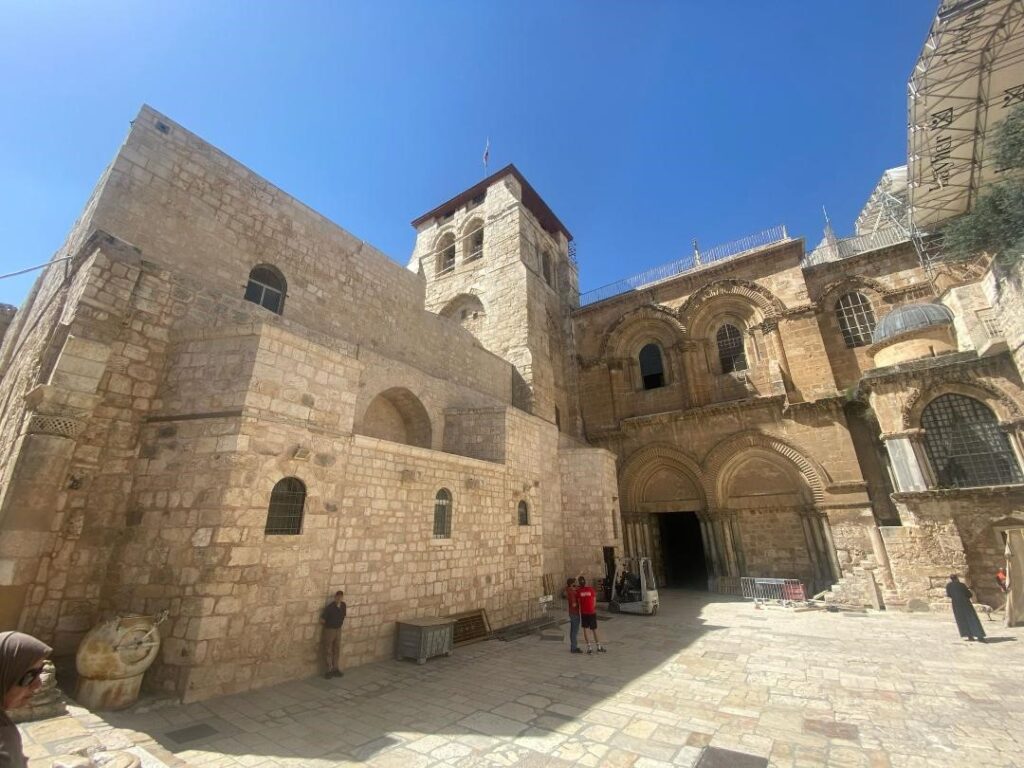
Al Aqsa Reflections 6
The 27th night of Ramadhan is a special occasion in Masjid Al-Aqsa. People travel far and wide from all over Palestine, flocking to the third holiest site in Islam. For many of these people, it is the only opportunity that they have during the year to visit Al-Aqsa. Estimates suggest that around 250,000 people visited Al-Aqsa during Laylatul Qadr, but it is difficult to know how accurate these estimates are. Those who have been present in previous years suggest that the number is lower this year, though you would not have thought it when seeing that every available space in the entire compound was being prayed upon.
In terms of the time period that people remained in the compound, it was essentially from Fajr on the 26th day of Ramadhan (which was also the day of Jumu’ah) until Fajr on the 27th day of Ramadhan. What is interesting is that the crowd after each of these fajr salaahs was bigger than any other I had seen during my time in Al-Aqsa. After fajr salaah had finished, the area between Masjid Qibli and Dome of the Rock was so packed that there was not a single space where the ground could be seen from overhead. The energy was electric and infectious. The crowd chantedبروح بدم نفيدك يا اقصىThis translates to: We will sacrifice our soul and our blood for you O Aqsa. Note, there was no violence or aggression and no Israeli soldiers were present within the confines of the compound, as they remained on the perimeters at the entry gates. Unsurprisingly, they had to display some element of force. On both nights, a drone was sent to the area between Al-Aqsa and Dome of the Rock. The drone was used to drop tear gas onto the crowd. It was my first experience of this, and it really does sting the eyes and nose, makes you cough and burns your skin. One can only imagine what is dropped from the skies in combat zones.
Reflections:
1. You have to experience 27th night in Al-Aqsa. Though I am against the idea of visiting Al-Aqsa in general as a ‘bucket list trip’, being here on the 27th night should definitely be on that list.
2. Tear gas may not kill, but it is nasty.
3. Regardless of the threat, every Palestinian is ready to lay down their life for Al-Aqsa. This explains why their country may be occupied, but Al-Aqsa still firmly belongs to the Muslims.
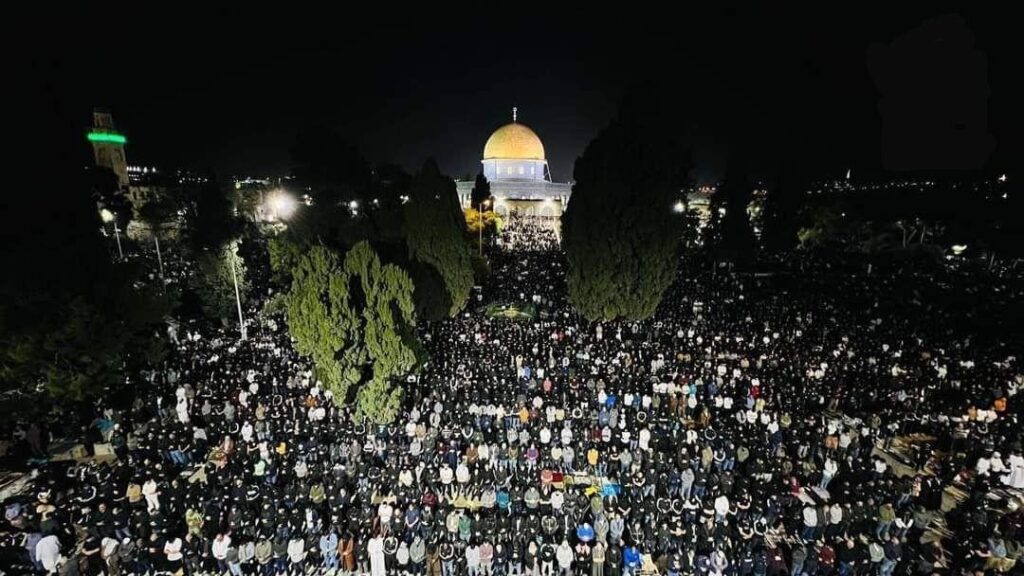



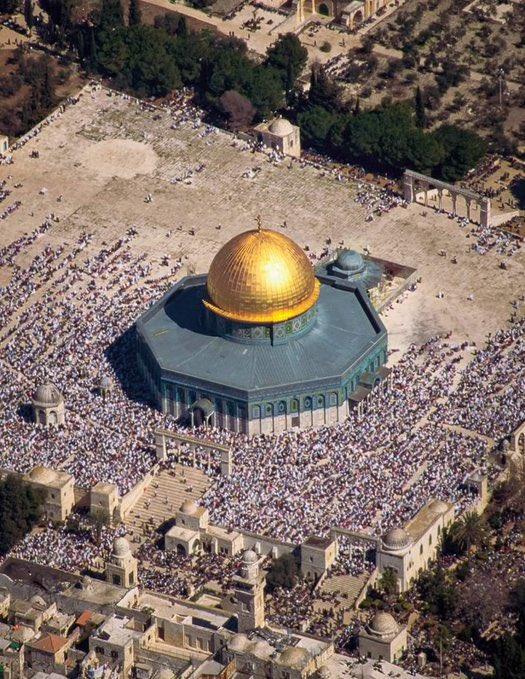
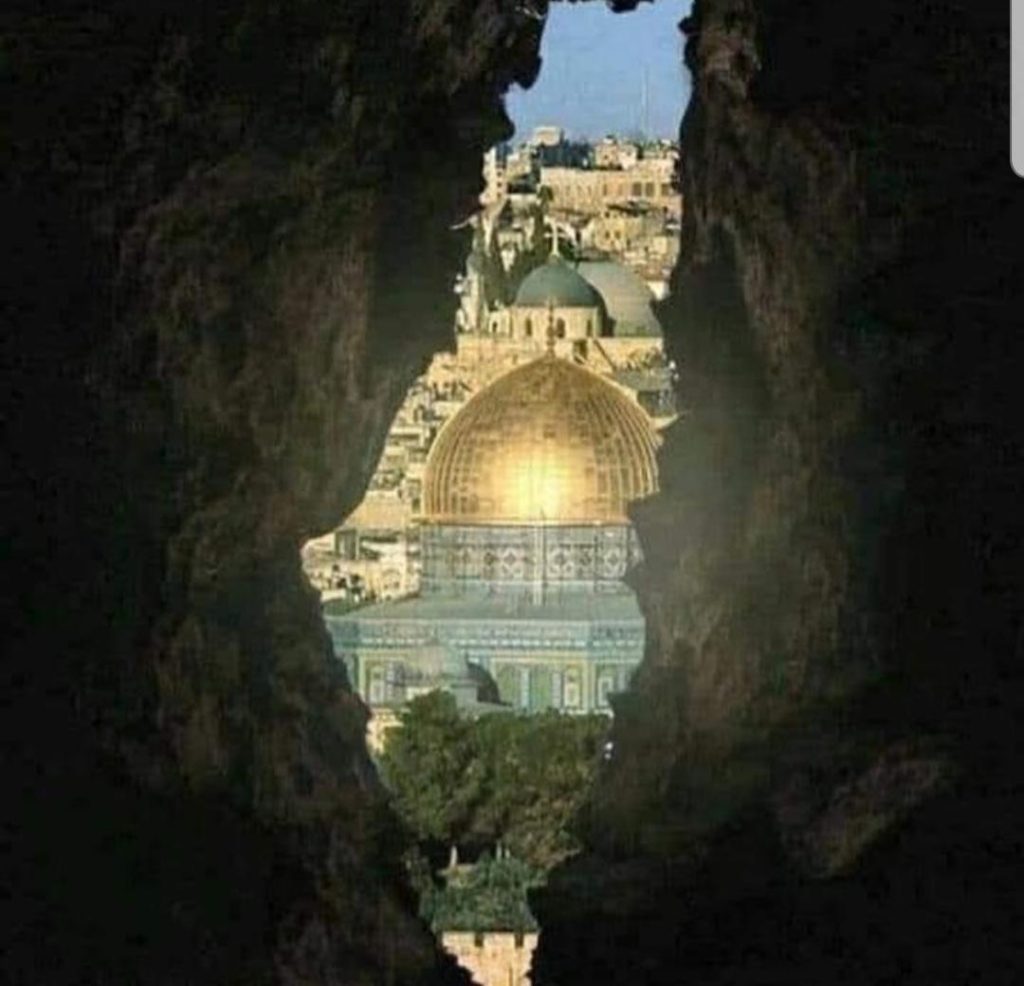
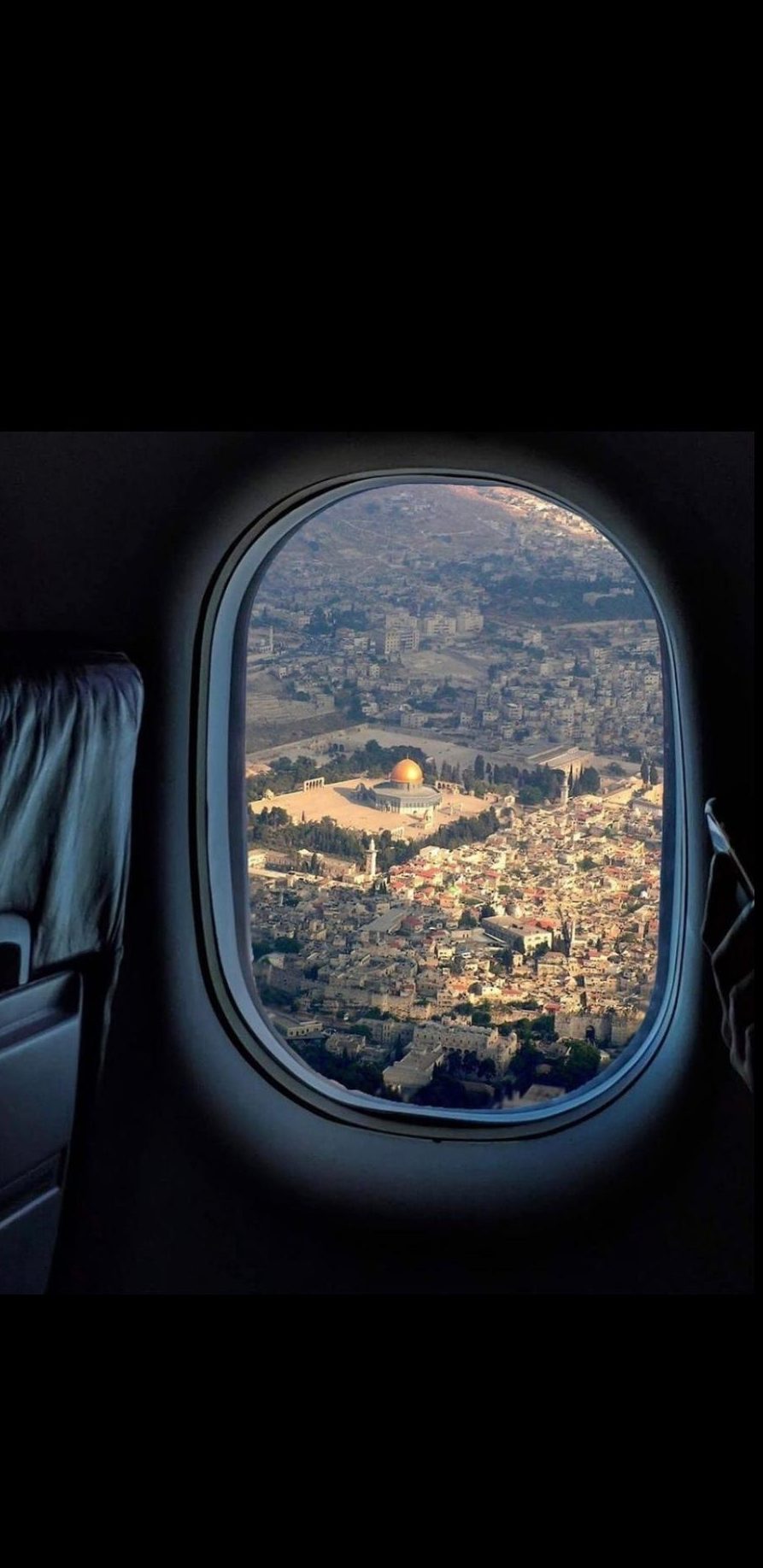
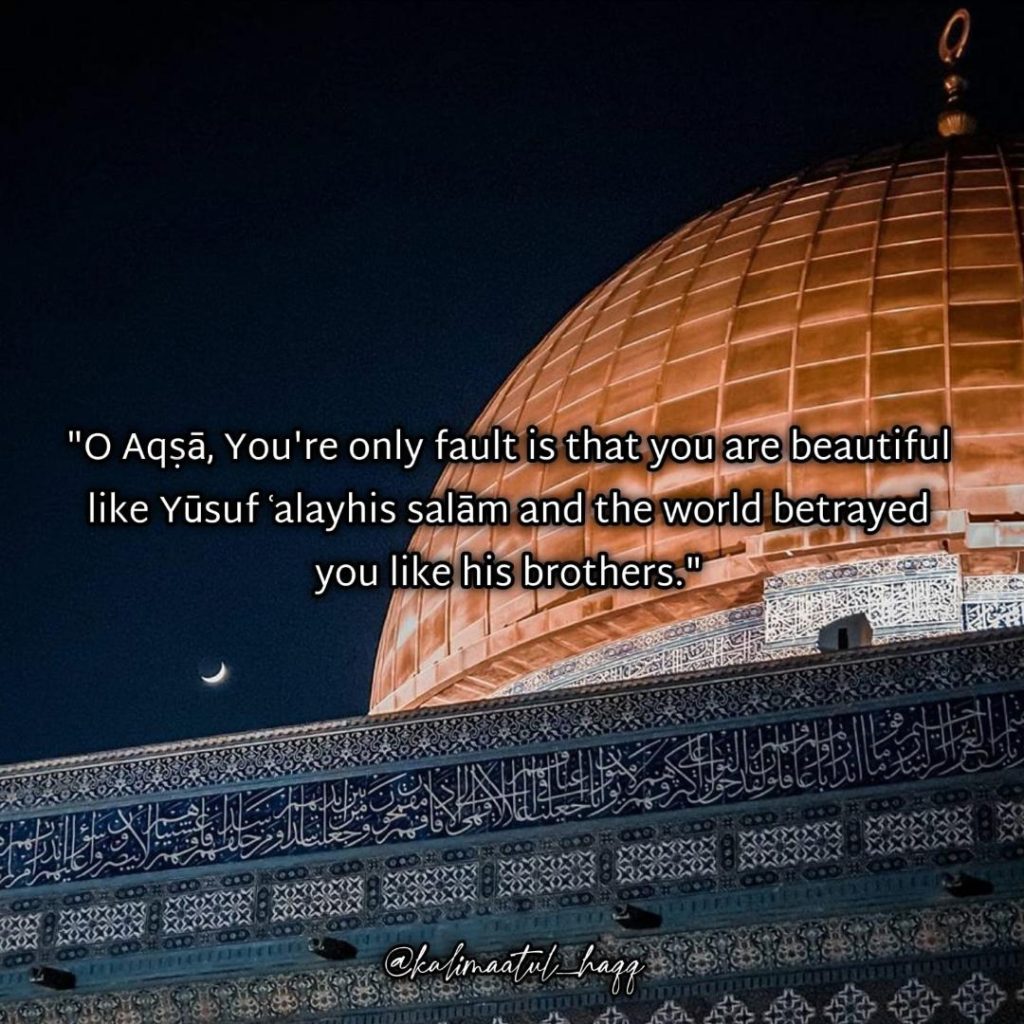
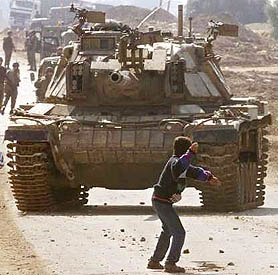
 “We hope in Allah Most High, to whom be Praise. Who leads the hearts of Muslims to calm what torments them and ruins their prosperity. Where is the sense of honor of the Muslims? The pride of the Believers? The zeal of the Faithful? We shall never cease to be amazed at how the disbelievers for their part have shown trusts, and it is the Muslims who have been lacking in zeal. Not one of them has responded to the call. Not one intervenes to straighten what is distorted; but observe how far the Franks have gone. What unity they have achieved. What aims they pursue. What help they have given. What sums of money they have borrowed and spent. What wealth they have collected and distributed and divided amongst them. There is not a king left in their lands or islands, not a lord or a rich man who has not competed with his neighbors to produce more support and rival his peers in strenuous military efforts. In defense of their religion they consider it a small thing to spend life and soul; and they have kept their infidel brothers supplied with arms and champions of war; and all they have done and all their generosity has been done purely out of zeal for him they worship in jealous defense of their faith.
“We hope in Allah Most High, to whom be Praise. Who leads the hearts of Muslims to calm what torments them and ruins their prosperity. Where is the sense of honor of the Muslims? The pride of the Believers? The zeal of the Faithful? We shall never cease to be amazed at how the disbelievers for their part have shown trusts, and it is the Muslims who have been lacking in zeal. Not one of them has responded to the call. Not one intervenes to straighten what is distorted; but observe how far the Franks have gone. What unity they have achieved. What aims they pursue. What help they have given. What sums of money they have borrowed and spent. What wealth they have collected and distributed and divided amongst them. There is not a king left in their lands or islands, not a lord or a rich man who has not competed with his neighbors to produce more support and rival his peers in strenuous military efforts. In defense of their religion they consider it a small thing to spend life and soul; and they have kept their infidel brothers supplied with arms and champions of war; and all they have done and all their generosity has been done purely out of zeal for him they worship in jealous defense of their faith.